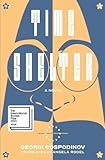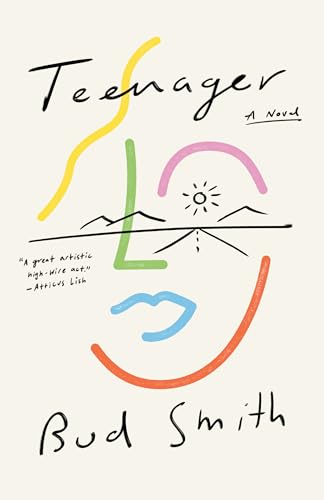Here’s a quick look at some notable books—new titles from Bud Smith, Jacqueline Harpman, Mark Haber, and more—that are publishing this week.
Want to learn more about upcoming titles? Then go read our most recent book preview. Want to help The Millions keep churning out great books coverage? Then become a member today.
Teenager by Bud Smith
Here’s what Publishers Weekly had to say about Teenager: “Smith’s vibrant and violent debut novel (after the collection Double Bird) captures the pain, ebullience, and illusions of a troubled young man’s adolescence. Kody Green, 17, raised in New Jersey foster care, has a wild imagination and dreams of becoming a cowboy. He also has seizures and delusions from a skull injury caused by one of his foster mom’s boyfriends. The best part of his life is his girlfriend Tella Carticelli, though her sexually abusive father has recently forced her to have an abortion after Kody got her pregnant. After learning Tella’s parents are sending her to Rome to break up their relationship, Kody murders them and the couple flees. Driving west in a series of stolen cars, they try to get pregnant again, visit Graceland (it’s disappointingly small), descend into the Grand Canyon, and dodge a series of dim-witted cops. After Kody invents false identities to land them jobs at a Montana ranch, their experience doesn’t quite match his visions of the West. Meanwhile, Tella’s older brother Neil goes AWOL from the Navy to search for her. Though a muddled resolution disappoints, there are plenty of mythic motifs and pithy insights (‘Kody thought they looked like any average family did, absolutely unhinged’), and the author evokes the surreal contrasts of the American landscape in smart, jittery prose. Smith makes this a trip worth taking.”
Time Shelter by Georgi Gospodinov (translated by Angela Rodel)
 Here’s what Publishers Weekly had to say about Time Shelter: “A radical new therapy tests the power of nostalgia in the electric and fantastical latest from Gospodinov (The Physics of Sorrow). In present-day Vienna, geriatric psychiatrist Gaustine redecorates his clinic in the style of the 1960s, replete with miniature pink Cadillacs and Beatles memorabilia. Patients with memory issues appear invigorated by the decor and share more during therapy. The narrator, an unnamed amateur novelist who had the same idea as Gaustine years earlier, comes across an article about the psychiatrist and seeks him out. They strike up an unusual collaboration: Gaustine establishes clinics that painstakingly recreate bygone eras with artifacts tracked down by the novelist. The clinics rapidly expand and start offering services to healthy people, and eventually entire countries opt to simulate returns to supposedly happier eras (France, Germany, and Spain all choose the 1980s). The clever prose sells the zany premise and imbues it with poignant longing: ‘Everything happens years after it has happened…. Most likely 1939 did not exist in 1939, there were just mornings when you woke up with a headache, uncertain and afraid.’ Thought-provoking and laced with potent satire, this deserves a spot next to Kafka.”
Here’s what Publishers Weekly had to say about Time Shelter: “A radical new therapy tests the power of nostalgia in the electric and fantastical latest from Gospodinov (The Physics of Sorrow). In present-day Vienna, geriatric psychiatrist Gaustine redecorates his clinic in the style of the 1960s, replete with miniature pink Cadillacs and Beatles memorabilia. Patients with memory issues appear invigorated by the decor and share more during therapy. The narrator, an unnamed amateur novelist who had the same idea as Gaustine years earlier, comes across an article about the psychiatrist and seeks him out. They strike up an unusual collaboration: Gaustine establishes clinics that painstakingly recreate bygone eras with artifacts tracked down by the novelist. The clinics rapidly expand and start offering services to healthy people, and eventually entire countries opt to simulate returns to supposedly happier eras (France, Germany, and Spain all choose the 1980s). The clever prose sells the zany premise and imbues it with poignant longing: ‘Everything happens years after it has happened…. Most likely 1939 did not exist in 1939, there were just mornings when you woke up with a headache, uncertain and afraid.’ Thought-provoking and laced with potent satire, this deserves a spot next to Kafka.”
I Who Have Never Known Men by Jacqueline Harpman (translated by Ros Schwartz)
 Here’s what Publishers Weekly had to say about I Who Have Never Known Men: “An account of a near future on an unknown planet where 40 women are imprisoned in underground barracks guarded by mysterious uniformed men, this novel marks the American debut of a writer the publisher proclaims as a new ‘womanist’ voice but who is in fact a veteran French novelist (Orlanda, winner of the 1996 Prix Medicis, etc.). The story is divided in two. It first describes the countless years of the women’s imprisonment; then is recounts their fortunate escape and slow realization that they are still prisoners, the only survivors on a barren planet they can’t flee. Nonetheless, their new freedom inspires an emotional and intellectual reawakening. The women search for answers to explain how and why they came to be imprisoned; they remember, painfully but fondly, their past lives. The most enthusiastic of them is the nameless narrator, the youngest member of the group. She explores the land, demands that the other women educate her and maintains her curiosity long after her companions have given up. But her insights are neither provocative nor profound, and the authority she assumes rings false. More interesting is her emotional development. As prisoners in the barracks, the women were forbidden to touch each other. The narrator never learns to appreciate fully the new possibilities of physical closeness and remains emotionally unattached to all but one of her companions, who serves as her mentor. But such telling details are rare here. While offering hints and glints of Harpman’s talent, this novel proves a disappointing Stateside debut.”
Here’s what Publishers Weekly had to say about I Who Have Never Known Men: “An account of a near future on an unknown planet where 40 women are imprisoned in underground barracks guarded by mysterious uniformed men, this novel marks the American debut of a writer the publisher proclaims as a new ‘womanist’ voice but who is in fact a veteran French novelist (Orlanda, winner of the 1996 Prix Medicis, etc.). The story is divided in two. It first describes the countless years of the women’s imprisonment; then is recounts their fortunate escape and slow realization that they are still prisoners, the only survivors on a barren planet they can’t flee. Nonetheless, their new freedom inspires an emotional and intellectual reawakening. The women search for answers to explain how and why they came to be imprisoned; they remember, painfully but fondly, their past lives. The most enthusiastic of them is the nameless narrator, the youngest member of the group. She explores the land, demands that the other women educate her and maintains her curiosity long after her companions have given up. But her insights are neither provocative nor profound, and the authority she assumes rings false. More interesting is her emotional development. As prisoners in the barracks, the women were forbidden to touch each other. The narrator never learns to appreciate fully the new possibilities of physical closeness and remains emotionally unattached to all but one of her companions, who serves as her mentor. But such telling details are rare here. While offering hints and glints of Harpman’s talent, this novel proves a disappointing Stateside debut.”
Saint Sebastian’s Abyss by Mark Haber
 Here’s what Publishers Weekly had to say about Saint Sebastian’s Abyss: “Haber (Reinhardt’s Garden) returns with a sharp-witted exploration of friendship, art, and criticism. The unnamed narrator receives an email from his former best friend, Schmidt, after 13 years of estrangement, with the news that Schmidt is on his deathbed in Berlin. The narrator flies to Germany, and what ensues is an examination of their decades-long friendship, initially forged over a mutual fascination with Saint Sebastian’s Abyss, a painting of the apocalypse that the two first discovered while students at Oxford. Schmidt and the narrator have since made their careers as art critics based on their insights on the painting and its creator, Count Hugo Beckenbauer. The pair had a devastating falling out after the narrator said something unforgivable, which Schmidt now refers to as ‘that horrible thing,’ and in the years since, the two have resorted to petty vendettas as their work turned away from the painting that they both revere and toward disproving each other’s theories. Schmidt—heavily mustached, chronically ill, and a staunch holder of harsh beliefs—is a difficult friend but memorable character. Haber intelligently explores how his leads’ small-mindedness gets in the way of their higher pursuits, as the narrative zeroes in on an inevitable and surprising conclusion. With this dark comedy of obsession, Haber keeps the Bernhard flame burning.”
Here’s what Publishers Weekly had to say about Saint Sebastian’s Abyss: “Haber (Reinhardt’s Garden) returns with a sharp-witted exploration of friendship, art, and criticism. The unnamed narrator receives an email from his former best friend, Schmidt, after 13 years of estrangement, with the news that Schmidt is on his deathbed in Berlin. The narrator flies to Germany, and what ensues is an examination of their decades-long friendship, initially forged over a mutual fascination with Saint Sebastian’s Abyss, a painting of the apocalypse that the two first discovered while students at Oxford. Schmidt and the narrator have since made their careers as art critics based on their insights on the painting and its creator, Count Hugo Beckenbauer. The pair had a devastating falling out after the narrator said something unforgivable, which Schmidt now refers to as ‘that horrible thing,’ and in the years since, the two have resorted to petty vendettas as their work turned away from the painting that they both revere and toward disproving each other’s theories. Schmidt—heavily mustached, chronically ill, and a staunch holder of harsh beliefs—is a difficult friend but memorable character. Haber intelligently explores how his leads’ small-mindedness gets in the way of their higher pursuits, as the narrative zeroes in on an inevitable and surprising conclusion. With this dark comedy of obsession, Haber keeps the Bernhard flame burning.”
Also out this week: Ill Feelings by Alice Hattrick and Jameela Green Ruins Everything by Zarqa Nawaz.









